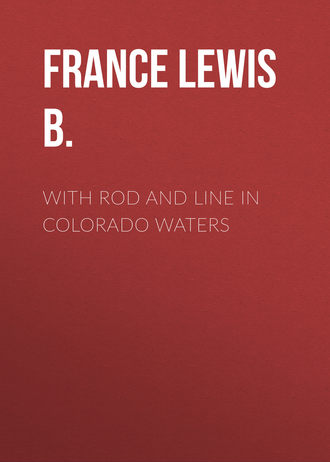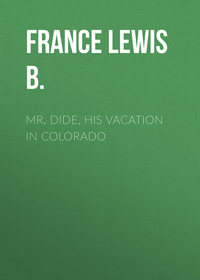 полная версия
полная версияWith Rod and Line in Colorado Waters
Mr. Doe announced himself at our front gate immediately after breakfast; he would no doubt have come to the door had I not obviated the necessity for his so doing by neglecting my coffee, and nervously anticipating him on the porch. He had his cane with him, and his shoes and linen presented their ordinary, unobjectionable appearance, as if defiant of criticism.
Our course was through the city, westerly some three miles, and out to a road beyond what in those days was called “The Heights.” The neighborhood was new to me, and Mr. Doe took pleasure, seemingly, in pointing out various objects of interest, not forgetting walnut and hickory trees, and even persimmons, that gave promise of good things after frost. Among other things, I remember he called my attention to a blue and misty looking object a great distance off, which looked in shape like the Pyramids of Egypt, as shown in my geography. This, he told me, was the Sugar Loaf; and when I asked him why it was so named, he thought because it did not resemble a sugar loaf. But it was my first mountain, and I have always carried with me a pleasant remembrance of it. Our road lay by an old frame house, with a porch and well, at which we stopped to drink. The house, he told me, was known as the “Bull’s Head;” why it was so named he was unable to inform me. Finally we reached the vicinity of it covered bridge, spanning a fine stream. He said it was the “Chain Bridge,” but not seeing any chains, I felt compelled to inquire why everything away from home seemed to bear titles that were evidently not appropriate. Not being able to impart to me any satisfactory information upon that head, he called my attention to the Little Falls; I learned these were called Little, because there were Big Falls farther up stream.
Mr. Doe informed me that this was a good place to fish. Unskilled in the gentle art, but curious, I suggested that it would afford me infinite delight to see him fish. He then wanted to know if I would not like to try my hand; being informed of my inability to do so through lack of knowledge and tackle, he forthwith cut a small pole, and from the hidden recess of his coat produced a line with a float and hook. Having rigged me out, he proceeded to unscrew the ferrule of his cane, and lo! the inseparable walking stick was transformed into a rod; his own manufacture, he said, as he held it out with the air of a critic and pardonable self-complacency. The recesses of his coat were again resorted to, resulting in a tin mustard box well filled with angle worms. Baiting my hook, he stationed me on a large rock and directed me to drop the lure into the gentle eddy beneath. That float, I remember, was painted red on the top, and looked to me like a highly colored bird’s egg drifting out of its element. Being informed that to watch it was my business, I did so with assiduity. Presently it bobbed up and down, then fell over on its side, then again bobbed up and down as though it were sentient and in sound of a fiddle exuding a hornpipe. I inquired of Mr. Doe the meaning of this, and was admonished by him to “look out,” that I had a nibble. Of all things desirable to me at that crisis, next to a bite, was a nibble. There was contained in it a fund of encouragement absolutely infinite, that left hope in the distance and resolved itself at once into faith.
“Now, jerk!” exclaimed Mr. Doe, as the float started off rapidly and suddenly disappeared. I jerked. And behold! a bit of burnished silver but little longer than my hand, its dorsal as suddenly expanded as if moved by electricity, standing stiff and defiant upon the sudden change of elements, only a shade duller than the sun’s rays, as it flashed into the light, – any first white perch, and my initial piscatorial triumph. Proud! The result of the accomplished details of section two of article two of our glorious bulwark announced to the fortunate choice of the majority of the unsoaped out of the seventeen millions and odd of the free and enlightened, placed him upon no loftier ground; I would have patronized His Excellency at that sublime moment.
“It was born in you,” said Mr. Doe, as he relieved the captive and placed him in my outstretched hands. My perception of Mr. Doe’s meaning was intuitive, and I suggested that I would like conviction impressed upon the mind of my other best friend by a personal examination of this peerless perch. Nothing could be more easily accomplished; it was slipped on a stout string and consigned to an isolated pool. During the ensuing hour my attention was divided between the jail of my captive, the red-top cork and the actions of Mr. Doe; that gentleman had stationed himself a few yards below me, and had secured quite a respectable string of perch, while I had added several, beside two tobacco-boxes, to my own.
At lunch it dawned upon me to inquire of Mr. Doe if he did not think it wicked to fish on the Sabbath. My recollection is that he felt loth to set himself up as a judge in the matter. But the leaping stream, the picturesque rocks, the trees and sweet air had attractions for him, and he could enjoy them but one day in seven; for those who had nothing else to do the case might be different; he thought that perhaps education had much to do with the matter – “One man esteemeth one day above another; another esteemeth every day alike. Let every man be fully persuaded in his own mind;” said Mr. Doe.
Somehow it crept into my youthful imagination, as I listened to him, that the beautiful river, the rocks and the trees, had been created for him, but that he claimed no monopoly. Yet no rich man could purchase them nor deprive him of his property; that for this he was thankful, and entertained for the philanthropic Creator of these the same sort of reverence, but in a new and quiet way, that I had been accustomed to hear must, to be acceptable, be expressed within doors. And I wondered, if he should be so unfortunate as to die then and there, whether he would go to heaven. My doubts as to myself, and the propriety of my participation in his peculiar worship were grave in the extreme.
The doubts, however, did not prevent my renewing the fascinating occupation of the forenoon, and thereby adding a few more victims to my already questionable spoils.
The shadows began to lengthen and grow quite grotesque is their attenuation, before I inquired of Mr. Doe as to his intentions about returning. He gave as his reason for not going sooner that he deferred to the prejudices of others to the extent of avoiding any aggressive expression of his own opinions, by trailing his fish through town in daylight. That while he saw no impropriety in passing the Sabbath out-doors in the fresh air and sunlight, there were those who would be shocked at what they deemed a desecration. He felt responsible to a higher authority for his acts, and would render his accounts at the proper forum in due course of time. Meanwhile he proposed to follow the admonition of the great apostle: “If it be possible, as much as lieth in you, live peaceably with all men.” Upon this he transformed his rod again into a walking stick, carefully stowed away the lines, and threw the remaining bait into the stream; we gathered up what had been vouchsafed us and started for home.
Tho condition of Mr. Doe’s mind was unquestionably tranquil, while mine was incumbered with doubts, yet devoid of apprehension, in the matter of serious consequences, at least. Our walk home was accomplished satisfactorily, the latter part of it being in the dark through the neighborhoods where we were best known, the twilight being short in that latitude and gas then only a possibility. He who had given me permission to go walking expressed severe astonishment at the evidences of the day’s doings presented to him. Mr. Doe was not a large man, but his shoulders were broad; he improved upon our original ancestor by assuming the responsibility. My enthusiastic portrayal of the delights experienced were listened to, I thought, with interest; I did not go supperless to bed, and I had some of the fish for breakfast. The diet was no novelty, but the flavor upon that occasion far surpassed that of any former experience, and no fish since has tasted so sweet as that first perch. The burnished silver tint had given way to an exquisite brown, delicate as the hue of an amber cloud painted by the evening rays of an autumn sun. Crisp, and with a fragrance to subdue the censorious palate of an epicure, he invited me to remove his dorsal, and lay bare in equal halves the firm, white meat; next, without a hair’s-breadth torn, the backbone cleaved as smoothly as a type from its matrix, and appetite and palate joined in adulation. I would cherish the memory tenderly, but, above all, the text and sermon of Mr. Doe.
BOURGEOIS.

